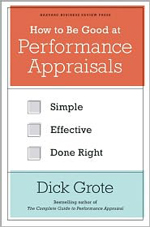What We're Reading Now
Four Things to Remember about Performance Reviews
30 October 2011
Rachel nodded and applauded her way through reading How to Be Good at Performance Appraisals by Dick Grote. At long last, managers have a practical guide to making the most of one of the most significant (and much-maligned) supervisory responsibilities of the year.
Tags: human resources, management and supervision, rachel read, recent release
I don't know anybody — employee or supervisor — who really looks forward to performance review season. It seems to invite so much angst and contention that there's even a fairly vocal contingent of management theorists advocating to abolish the time-honored practice of performance reviews entirely. To me, that's a lot like throwing the baby out with the bath water and adjusting to the lowest common denominator; it's essentially saying, "Since managing effectively all year long is hard enough and most supervisors don't do effective reviews anyway, let's just get rid of the appraisal process."

However, writing and conducting reviews is among the very long list of responsiblities that most organizations assume newly promoted supervisors will magically learn how to do through osmosis. If appraisals are going to live up to their promise, many more managers and supervisors need to be equipped to navigate the ins and outs of a good review successfully. So I'm extending a heartfelt thanks to Dick Grote and Harvard Business Review Press for one of the best instruction manuals I've seen in years. With practical advice (that's very consistent with what you'd hear from any member of the Allison Partners team), helpful examples, and even a few sample scripts for particularly tricky situations, this guide refutes almost all of the excuses we often hear about why review processes don't work.
First and foremost, How to Be Good at Performance Appraisals does a terrific job of reminding all of us just what a review is: a summary of a manager's informed opinion about an employee's performance. Even in today's sometimes litigious environment, organizations rely on managers to use sound judgment and manage performance accordingly. Released from the misconception that an appraisal should be empirically defensible, managers are able to reframe their responsibility to use reviews as an actual management tool. So, inspired by Grote, four more things to remember about performance reviews.
One. Begin with the job, not the person. One way to be objective about one's opinions is to ground assessments in consideration about a role and its requirements before starting to evaluate an employee's performance. If I've said it once, I've said it a dozen times: it all starts with a good job description. Don't have one? Get with your human resources colleagues and write one.
Two. Be wise and SMART. Just because a goal is SMART (specific, measurable, achievable, realistic, time-bound) doesn't mean that it's useful and appropriate. Make sure that in addition to using the SMART checklist on your employees' goals, you also take a step back to make sure that they're wise, too.
Three. A '3' is not a 'C.' With 5-point rating scales dominating the landscape, many employees and supervisors contribute to a phenomenon of grade inflation by equating the midpoint "meets expectations" rating with a ho-hum "C" on a high school report card. Not so! Grote suggests thinking about the midpoint like par in golf . . . it might be what's expected, but you should still be pretty proud when you achieve it.
Four. Avoid the compliment sandwich. You know, it's that conversation where you put a thin slice of suggestions for improvement bologna in between two thick, soft, squishy slices of compliment bread. Instead, focus your conversation on the compliments for your strong performers and on the necessary improvements for the others, and increase the chances that your employees fill up on the most important message.

What do you wish people would remember about performance appraisals? Add your comment to join the conversation.







Comments
Our Comment Policy:
Our blog posts are only half of the conversation. What our readers have to say is equally important to us, and we're grateful for all the comments that continue the dialog.
To ensure that the discussion here is as useful as possible to all of our readers, please be respectful of our contributors and refrain from harassing, threatening and/or vulgar language. We reserve the right to screen and remove any comments from the site. If you have a question about a comment or want to discuss our policy, please contact us. We'll talk it over.
Michael Latsko
Dec 20, 2011
Sounds like an interesting read…and I intend to give it a full read. The one thing that piqued my interest:
“the *misconception* that an appraisal should be empirically defensible…” seems to smack the face of those of us raised on the notion of “evidence-based performance” and “e-b performance measures.” I’m sure there’s more to it since the review is supposed to be an “informed opinion” which suggests a deductive conclusion based on a set of observations and facts.
Allison Partners
Dec 20, 2011
You’re right, Michael. Grote’s reminder that appraisals are ultimately opinions is pretty jarring. I’d agree (as I think Grote would) that opinions need to be supported by real observation and relevant evidence. That said, there are a lot of things that matter at work (e.g. collaboration, attitude) that many managers have trouble addressing because there’s no empirical ‘proof.’ I found Grote’s advice helpful when thinking about how best to address those ‘softer’ areas for feedback.